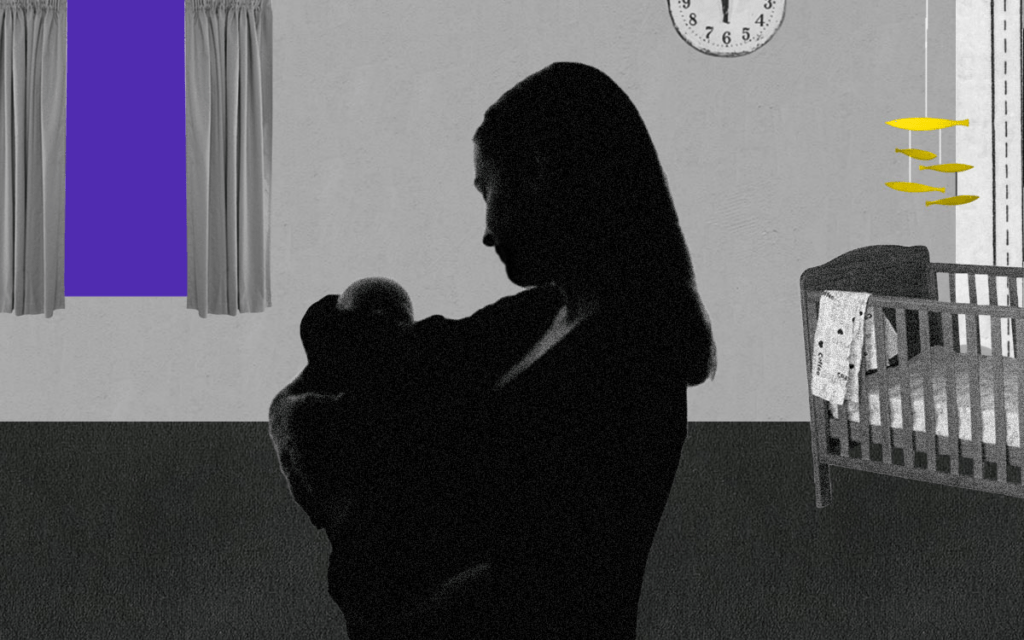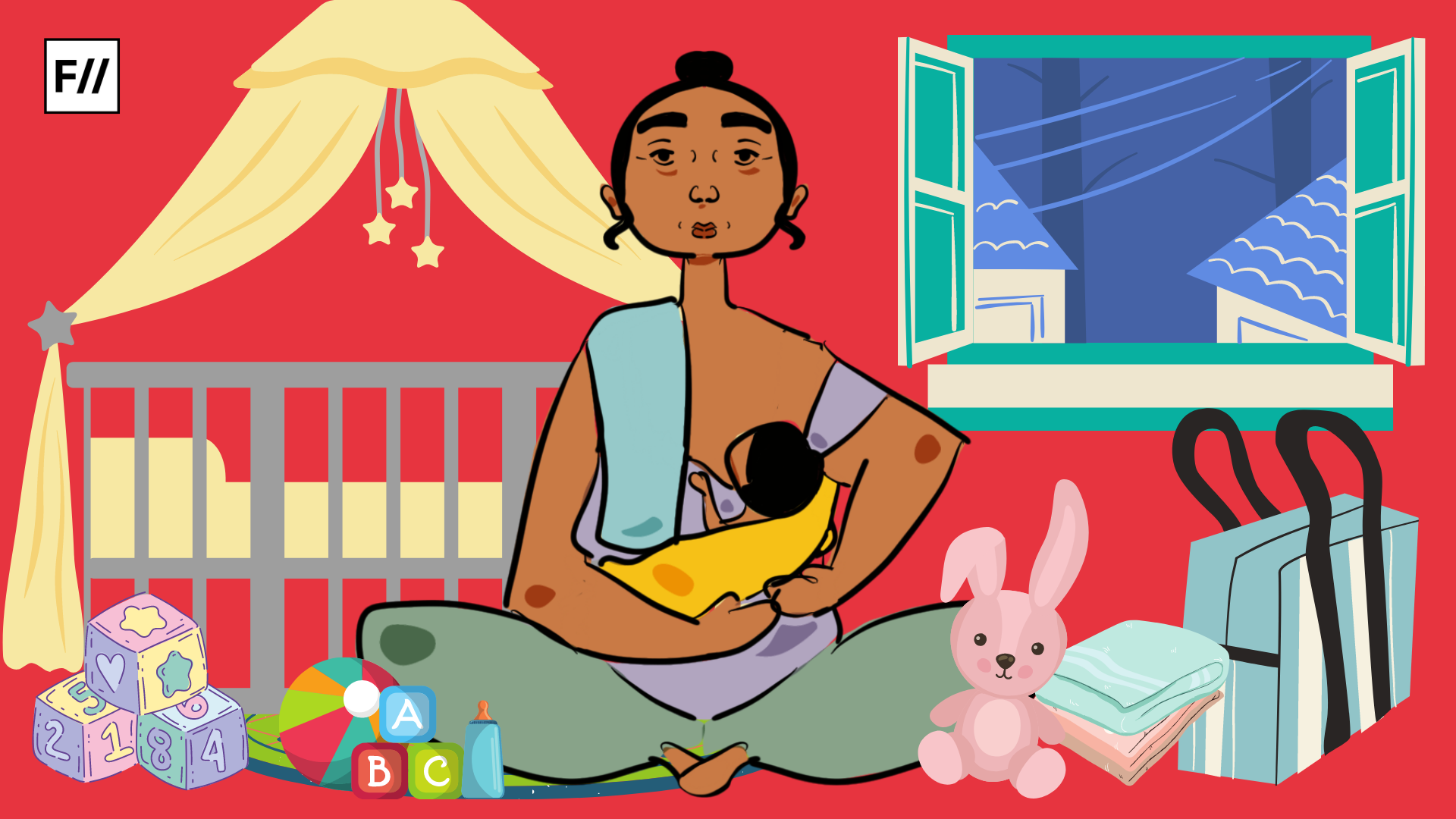“My Nani died of postpartum depression,” says Mahira Khan, a 23-year-old from Raipur. “She was a very religious lady who had a happy marriage, two lovely children, and showed no signs of dissatisfaction or mental instability. However, when she gave birth to her youngest daughter, she became very distant from her family. She would stare in the distance for long hours, while her baby lay crying in her lap. This was around the 80s, so no one had an idea of what was happening to her. When she was shown to the doctor, they said that she has depression and that is something new mothers often face. But no one knew how to heal her. My nana even got a television set to cheer her up. Nothing worked. One day, she went missing. We found her body in a well some distance from the house. We don’t know how she reached there; whether it was a death by suicide or an accident.”
A 2017 research published in the National Library of Medicine points out that 22 percent of new mothers suffer from postpartum depression in India. In the simplest terms, postpartum depression can be defined as a mental health condition that causes behavioural changes in a new mother after she delivers her child.
It may range from a small duration of sadness to something as extreme as suicidal behaviour. Some symptoms that show up in women are intense sadness, sleep deprivation, fatigue, loss of interest and poor appetite among others. A study published in 2019 in the Tzu Chi Medical Journal says that 100-150 of 1000 women giving birth suffer from some type of postpartum depression worldwide.
However, this condition is still not as widely known as it should be. Despite the presence of several awareness articles on the internet, there is a lack of knowledge about it within homes. Despite the large number of women affected by the condition, India is still not talking enough about postpartum depression.

Homaira Ali who resides in Jogeshwari in Mumbai gave birth to twin daughters last year. Her children are extremely sensitive to loud noises and anyone apart from her immediate family members, so much so that they start crying if their mother even sneezes. The doctor diagnosed the babies with stress and anxiety, saying they were born with it, the reason being that their mother was extremely disturbed while she was pregnant.
“After I delivered my twins, I gained a lot of weight and had wrinkles on my tummy. No matter how hard I tried, I couldn’t shed the weight. My in-laws, instead of supporting me during this time, body shamed me. I became so insecure about my appearance that it started affecting me mentally. I developed problems with lactation so I visited the doctor. They diagnosed me with postpartum depression. None of the medication, however, worked. The doctor said it would work only if I stopped stressing, as the effect of the medicines depends on one’s mindset. But my mental state was nowhere close to getting better. I was already being treated poorly by my in-laws from before the pregnancy, then the lack of support from my husband and the extreme change in my physical appearance were the last straws,” says the 24-year-old.
A report submitted to the WHO by a group of doctors in Delhi outlines some causes for postpartum depression which include financial difficulties, domestic violence, history of psychiatric illness in the mother, marital conflict, lack of support from the husband, and birth of a female baby. A number of these causes are purely cultural. In India, a woman’s mental health is often affected negatively due to toxicity from in-laws and the pressures of marriage into a new family.
A mother being unhappy at the birth of her child, even if it is purely due to a hormonal condition, is a reality that most Indians cannot still fathom. We end up getting confused, or worse, judgemental on seeing such mood fluctuations in new mothers. Dr. Bagadia points out cases when the woman diagnosed with postpartum depression is instantly labeled as a ‘mental case’ and lives in the fear that her child might be taken away from her. The stigma associated with the condition is huge and women receive little to no support when they speak of their struggles
Dr. Ashlesha Bagadia, Perinatal Psychiatrist and Head of Psychotherapy Services at The Green Oak Initiative Community Mental Health Centre, Bangalore talks about the environment that breeds postpartum depression in new mothers. “Generally I’ve seen families where the focus turns entirely on the baby and the mother’s needs are completely ignored, especially if there is a pre-existing conflict in the family. There are also cases where the woman may choose to go back to work after her baby is delivered but the choice is not supported by the rest of the family. The women are left feeling like they can’t be vulnerable and end up suffering in silence.”
She adds that the stigma around the disease is huge and it makes it very difficult for mothers to get the right kind of help. Even the most well-meaning family members give ignorant advice due to a lack of understanding.
The intensity of postpartum depression varies from individual to individual. There are postpartum blues that last for a few days or a week post delivery and usually go away with consistent reassurance. Postpartum psychosis is a more serious condition that begins within four weeks of birth and needs hospitalisation, the rate of which is much lesser. Postpartum depression usually starts right after childbirth or is a continuation of antenatal depression.
Also read: What Is Postpartum Depression? : Addressing The Complexities Of Post Childbirth Mental Health

Unlike Homaira, Shabista Sayed, a resident of Grant Road in Mumbai, was confused when she was diagnosed with postpartum depression. She had a relatively ‘happy’ life with a healthy son, a loving husband and a supportive family on both sides.
“When my daughter was born, I would cry constantly throughout the day for no reason. I didn’t feel like bonding with my child. The only stress I had undergone during the pregnancy was my constant overthinking if I would have a normal delivery. I visited a psychologist who diagnosed me with postpartum depression. Although I healed after two months, my biggest regret is that I couldn’t breastfeed my daughter throughout this time. Although I fed my son for one and a half years, my daughter left it on her own during the two months I was depressed,” says the 30-year-old.
The effect on the child is probably the most worrying factor for the woman during these times. Research points out that children with mothers who suffered from postpartum depression have greater cognitive, behavioural, and interpersonal problems as compared to other children with a dissimilar situation.
A meta-analysis shows that in developing countries, such children are also more likely to be undernourished and stunted. During the postpartum depression, women may struggle to connect with their children. In India, this is often considered an abomination because women, especially in the role of mothers, are placed on a pedestal. They are seen as beings who can do no wrong and devote their lives to their children.
A mother being unhappy at the birth of her child, even if it is purely due to a hormonal condition, is a reality that most Indians cannot still fathom. We end up getting confused, or worse, judgemental on seeing such mood fluctuations in new mothers. Dr Bagadia points out cases when the woman diagnosed with postpartum depression is instantly labelled as a ‘mental case’ and lives in the fear that her child might be taken away from her. The stigma associated with the condition is huge and women receive little to no support when they speak of their struggles.
This also leads to reluctance in such conversations, resulting in a scenario where postpartum depression is only a topic for health journals and portals, never going out in the world as an actual discussion we may have with people we know, who are affected by this.
External factors regarding lifestyle, already existing financial and socio-economic issues, a toxic environment, a woman’s internal struggle with her changing appearance and life, and lack of support and understanding from the people around her play a big role in the development of postpartum mental health issues. Thus, there needs to be a large-scale change in our very core values and gender-based roles

Dr. Shehla Jamal, a gynaecologist working at the Rajshree Medical Research Institute at Bareilly talks about her experience with new mothers. “Just recently, I have met women who have attempted death by suicide, wanted to kill their child or asked for a divorce from their husbands postpartum.” While talking about the treatment, she says that the gynaecologists always take counsellors’ help for navigating maternal mental health. “We don’t tell the patient that they are suffering from postpartum depression as they tend to react negatively. The term depression is still taboo and it often starts with the patients themselves, who refuse to believe that they are suffering from a condition. Most women don’t even know that a thing such as postpartum depression exists. We screen them by looking at their past depressive episodes, temperament, family history of mental health issues, nature of pregnancy and if there has been any domestic violence.”
Swathi, a software engineer from Chennai, had her first child in 2021. She first developed postpartum blues which later turned into depression. While she could have gone the official diagnosis and treatment way, the mother of one chose to not consume medicines or take therapy. “I read self-help books, spoke to my friends and other mothers, listened to motivational stories, did exercise and listened to music. These were the ways by which I could pull myself out of the depressive zone,” she says.
While these are some ways that therapists and doctors employ to help patients with postpartum depression, it is important to also not to overlook the need for proper treatment when it arises. Dr. Beena Sawant, a senior clinical psychologist based in Mumbai says that postpartum depression is essentially a condition developed by hormonal or biochemical changes. She says, “Depending on the investigation, one may go for hormonal treatment or therapy. We decide whether the patient needs a psychologist or a psychiatrist by looking at the intensity and symptoms. Apart from this, even the woman’s family needs education regarding behaviour and management. Mothers and fathers should take lessons on maternal mental healthcare before the delivery. On a larger scale, we must educate the people through social welfare systems, skits, and other public domains.”
Also read: Normalizing Postpartum Depression: Mental Health For New Mothers

While the medical and mental health community is actively working towards destigmatising conversations around maternal mental healthcare, the issue with the taboo is more cultural than it is about healthcare. Despite a growing awareness and resources being brought into place, things will continue to look bleak until there is a revolution within homes and mindsets.
A noticeable change these days is that men have begun to play an active part in parenting and looking after their wives in the postpartum period. Other members of the family also need to step up and make things as easy as possible for a new mother.
External factors regarding lifestyle, already existing financial and socio-economic issues, a toxic environment, a woman’s internal struggle with her changing appearance and life, and lack of support and understanding from the people around her play a big role in the development of postpartum mental health issues. Thus, there needs to be a large-scale change in our very core values and gender-based roles.
Ramsha is currently pursuing her Master’s in Convergent Journalism from AJK MCRC, Jamia Millia Islamia. She is a media aspirant and an independent journalist. Follow her on Instagram.




